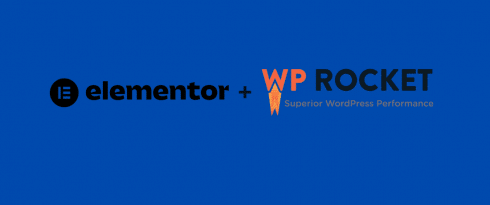Table of Contents
Last update on
This is a guest post. Opinions and recommendations are the author’s own and not necessarily those of WP Rocket.
If you have a WordPress site, you’ve probably gotten tired of people telling you how crucial it is to have your site load quickly.
People talk about site speed so much for a reason, though — slow sites annoy visitors, don’t rank as well in Google, and don’t get as many conversions. Any one of those factors alone is worth your attention, but one issue causing all three problems is a five-alarm fire.
But at the same time, you probably don’t want to sacrifice your site’s design or features in the quest for site speed.
What use is a fast site if the design is bad and the other aspects of user experience aren’t there?
Basically, you need a way to access all of the essential design options and features that your site needs, but without sacrificing your site’s performance.
That “way” is the combination of Elementor and WP Rocket. Elementor can give you visual, drag-and-drop design flexibility and useful features, all while eliminating the need to weigh your site down with other plugins or themes.
Then, WP Rocket can build on Elementor’s optimizations to further slim down your site and speed up its load times.
In this post, we’ll take a look at this combination and show you how it works.
Why Is Website Speed Important?
Having a fast-loading website is incredibly important because a slow site will negatively affect your site’s success in a number of different areas.
User Experience and Engagement
The first issue with slow sites is the general user experience. Simply put, users don’t like slow-loading websites because they’re frustrating to use. In many cases, users will just flat out refuse to use slow-loading websites.
One data point that illustrates this idea is bounce rate. The slower the site, the higher the bounce rate (which means more users are leaving your site without visiting a second page).
For example, Pingdom found that going from one-second load times to five-second load times increases the bounce rate by ~5X!
Search Engine Optimization (SEO)
Having a slow website can also negatively affect your site’s SEO rankings, especially with Google’s new Core Web Vitals metrics and the Page Experience SEO algorithm update from 2021.
In Google’s Page Experience update, they officially started using site speed (via Core Web Vitals) as an SEO ranking factor.
While content and backlinks are still the most critical part of SEO, having a slow-loading site will put a damper on your rankings, especially in competitive niches.
Conversion Rate
Having a slow site can also negatively affect your conversion rates, which can be especially problematic for eCommerce stores.
Data from Portent shows that having load times between 0-2 seconds is ideal for conversion rates, with a notable drop-off beyond that.
What Impacts Website Speed?
At a very high level, there are two factors that impact how quickly your website loads. You can roughly divide them as follows:
- Backend performance
- Frontend performance
Backend performance is your site’s infrastructure, which includes the following details:
- Hosting – higher-performance hosting means a faster website, and lower-performance hosting means a slower website.
- Content delivery network (CDN) – a CDN can reduce the physical distance between your site’s files and visitors around the world, which speeds up download times and leads to a faster site.
- Caching behavior – using page caching can reduce the work that your server needs to do for each visit, which lets it “respond” faster with your site and speed up load times.
Frontend performance refers to how optimized the frontend files on your site are. If your frontend files are large or load in an unoptimized way, that will lead to a slow-loading site even if your backend infrastructure is perfect.
This area includes the following details:
- WordPress theme – unoptimized themes can load a lot of resources and load them in a way that leads to slower perceived load times.
- WordPress plugins – poorly optimized plugins can add a lot of file size and code to your site, which will slow download times. The more “heavy” plugins you add to your site, the slower its load times will be.
- Images – on average, images account for around 50% of the file size of an average website, especially if you’re not optimizing your images. By increasing the file size of your site with unoptimized images, it will take longer to load.
Optimized backend infrastructure can overcome some issues with poor frontend optimization, and optimized frontend code can overcome some issues with backend optimization.
But if you really want to have a fast website, you need both optimized frontend code and backend infrastructure.
How Elementor Speeds Up Your Website
Elementor is a WordPress website builder that lets you design some or all of your site using a visual, drag-and-drop interface — zero code required.
While the added design flexibility and useful features like a popup builder are certainly nice, Elementor also gives you the tools to create a faster-loading site.
Let’s go through them.
Built-In Widgets to Eliminate the Need for Other Plugins
In general, the more plugins you add to your site, the more you’ll weigh your site down with extra CSS scripts, JavaScript, and so on, especially if those plugins aren’t optimized for performance.
With Elementor, you can eliminate the need to install a lot of separate plugins because Elementor offers built-in widgets for key features. Here are some examples:
- Forms – instead of installing a form plugin, you can just use the Elementor Form widget.
- Galleries – instead of installing a dedicated gallery plugin, you can just use the Elementor Gallery widget.
- Sliders – instead of installing a dedicated slider plugin, you can just use the Elementor Slides widget.
- Socials share buttons – instead of installing a dedicated social share plugin, you can just use the Elementor Share Buttons widget.
You probably get the idea by this point – you can check out the full Elementor widgets list to see all of the plugins that you can replace with Elementor.
Hello Theme Provides the Most Lightweight Foundation Possible
If you’re using Elementor to design your entire site, you won’t need to rely on your theme for design like you normally would. However, your theme will still be there loading its assets, which means your theme can still affect your site’s performance.
To address this, Elementor offers its own free theme called Hello. Hello offers the most lightweight canvas possible for your Elementor designs, which ensures you’re not slowing down your site with any unnecessary CSS or JavaScript.
If you check out the WP Rocket collection of the fastest free WordPress themes, you’ll see that Hello has the smallest size of any theme, along with a perfect 100% score on the PageSpeed Insights mobile test.
Ever-Expanding Performance Optimizations
The Elementor team knows that performance is essential, which is why they’ve been working on finding new ways to improve performance for Elementor sites even further.
For example, Elementor is working on using dynamic asset loading so that Elementor will only load the bare minimum of assets needed for each page.
Beyond that, Elementor is working on further reducing existing JavaScript and CSS usage, speeding up backend rendering processes and reducing the size of its code output to slim down the DOM (a technical term for the HTML structure of a page).
Basically, these types of improvements mean that your Elementor designs will only get faster as time goes on.
How to Make Elementor Even Faster With WP Rocket
If you want to make Elementor even faster, you can pair it with WP Rocket.
WP Rocket builds on the optimizations in Elementor to help you further improve frontend and backend performance on your site.
First off, WP Rocket automatically implements page caching as soon as you activate the plugin, which will make massive improvements to your site’s backend performance.
Instead of forcing your server to dynamically process PHP for each visit, WP Rocket lets you store the finished versions of your page in a static HTML cache. By serving up pages directly from the cache, your server has to do a lot less work, and your site will load a lot faster.
WP Rocket can also help you connect to a CDN, which will speed up the delivery times for visitors around the world by letting visitors download important static assets from the nearest CDN location. Or, you can easily use WP Rocket’s dedicated CDN, called RocketCDN.
WP Rocket also includes tons of features to further improve your site’s frontend optimization:
- Remove unused CSS – you can remove unnecessary CSS on a page-by-page basis, which ensures that each page only loads the bare minimum of CSS needed for that design.
- Delay JavaScript execution – you can wait to load JavaScript files until a user interacts with your site, which will vastly speed up initial load times by reducing the amount of JavasScript that needs to load at first (including the Largest Contentful Paint metric). You can also exclude Elementor files from being delayed to ensure compatibility.
- Code minification – you can minify your code to remove whitespace and unnecessary characters.
These optimizations will make further improvements to your Elementor designs (as well as any content that you’ve created with the native WordPress editor).
Pretty much the only thing WP Rocket can’t do is optimize your Elementor site’s images. But there’s another plugin for that – Imagify! With Imagify, you can optimize your site’s images on autopilot, including resizing them, compressing them, and converting them to the performance-friendly WebP format.
For more details, Valentina wrote a complete guide to speeding up Elementor with WP Rocket.
Create a Faster-Loading WordPress Site Today
Your site’s load times are incredibly important, and only getting more important as Google focuses on Core Web Vitals and releases algorithm changes like its Page Experience update.
With Elementor, you can streamline your site’s performance by using the most lightweight theme possible, Hello, and eliminating the need to use third-party plugins for essential features such as forms, galleries, social share buttons, and more.
Then, you can install WP Rocket to improve your site’s performance even further by speeding up backend performance with caching and optimizing frontend performance with improvements to CSS, JavaScript, and other crucial areas.
Put them together and you can build lightning-quick WordPress sites without needing to sacrifice features or design flexibility.



